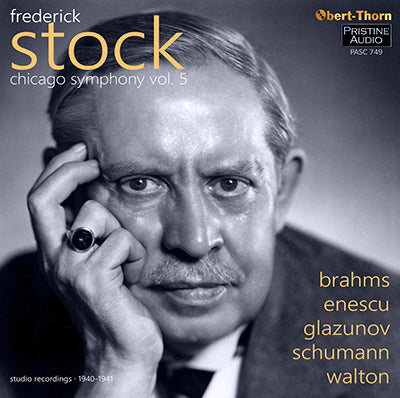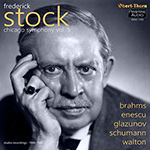
This album is included in the following sets:
This set contains the following albums:
- Producer's Note
- Full Track Listing
- Cover Art
Between the end of Volume 4 and the first work on this volume, Stock made his only two concerto recordings for Columbia. On the same day (6 March 1940), he set down the Tchaikovsky Violin Concerto with Milstein and the Saint-Saëns Cello Concerto No. 1 with Piatigorsky. As both of these have seen several CD reissues already, they are omitted from this series.
The next session, held on 23 November 1940, featured Stock’s only electrical recording made in New York while the orchestra was on tour, the Brahms Third Symphony. Stock’s reading here, like many of the other performances on this release, is filled with an energy and forward momentum that belies his reported health problems which had led to the engagement of Toscanini’s assistant from the New York Philharmonic, Hans Lange, to join the CSO as assistant conductor several years earlier to help shoulder the workload.
The remaining Columbias in this release were all set down during two very fruitful days of recording the following year, Friday and Saturday April 25th and 26th, 1941. These were given over to recording mainly shorter pieces (overtures and “pops” material), with the only extended work being the Schumann Fourth. It is noteworthy that of the seven complete symphonies Stock recorded over his career, two were by Schumann (this and the 1929 Victor recording of the “Spring” Symphony on Volume 2 (PASC 684)). By this time in his career, Stock’s approach had changed from the rather gemütlich approach of the earlier recording to a more driven, Toscanini-like reading, entirely appropriate to this more dramatic score.
Stock’s largely conservative discography might blind us to the fact that he was a champion of contemporary repertoire throughout his career. He was the first to perform the Mahler Seventh in the USA; and a year after Stokowski had given the American première of the Eighth in Philadelphia in 1916, Stock programmed it in Chicago. In 1921, he conducted the world première of Prokofiev’s Piano Concerto No. 3 with the composer as soloist, and was the first to champion Florence Price by conducting her First Symphony in 1933.
For the orchestra’s 50th season (1940-41), Stock commissioned a number of famous composers to contribute new works to be premièred by the ensemble, including Stravinsky’s Symphony in C, Miaskovsky’s Symphony No. 21, Kodaly’s Concerto for Orchestra and Milhaud’s First Symphony. The only work which Stock recorded from this endeavor was Walton’s Scapino Overture. Scapino was an Italian Commedia dell’Arte figure known to escape scrapes and close calls with his wits, and Walton constructed an aptly fleet work to showcase him. This disc, recorded three weeks after its première on 3 April 1941, utilizes the original scoring for large orchestra. In 1950, Walton revised the score for smaller forces in a version that was first given by Furtwängler and the Philharmonia Orchestra that year. The work is close in spirit to Arthur Benjamin’s “Overture to an Italian Comedy” which closes this release, although the Benjamin predated the Walton by several years.
As far as the rest of the repertoire goes, Glazunov must have been one of Stock’s favorite composers, because his works are featured in his discography as far back as his early acoustic recordings as well as in his late-Twenties Victors. Here, he gets to record three full discs of the composer’s works. The Liadov was never issued on 78s, probably because it was an “odd side” that didn’t have a coupling. And Stock’s arrangement of Paganini’s “Moto Perpetuo”, with its quotations from Beethoven’s Eroica/Prometheus music in counterpoint, is much cleverer than Toscanini’s more straightforward all-string arrangement recorded two years earlier.
Our next volume will be the final one in this series, featuring the remainder of Stock’s non-concerto Victors from 1941.
Mark Obert-Thorn
FREDERICK STOCK and The Chicago Symphony, Volume 5
disc one (75:42)
BRAHMS Symphony No. 3 in F major, Op. 90
1. 1st Mvt. - Allegro con brio (8:46)
2. 2nd Mvt. - Andante (7:53)
3. 3rd Mvt. - Poco allegretto (6:08)
4. 4th Mvt. - Allegro - Un poco sostenuto (8:39)
Recorded 23 November 1940
Matrices: XCO 29139-2, 29140-1, 29141-1, 29142-2, 29143-1, 29144-1, 29145-1 & 29146-1
First issued on Columbia 11505/8-D in album M-443
5. WALTON Scapino, a Comedy Overture (9:24)
Recorded 25 April 1941 ∙ Matrices: XCO 30554-1 & 30555-3
First issued on Columbia 11945-D
SCHUMANN Symphony No. 4 in D minor, Op. 120
6. 1st Mvt. - Ziemlich langsam - Lebhaft (8:09)
7. 2nd Mvt. - Romanze: Ziemlich langsam (4:23)
8. 3rd Mvt. - Scherzo: Lebhaft (4:11)
9. 4th Mvt. - Langsam - Lebhaft (7:07)
Recorded 25 April 1941
Matrices: XCO 30751-2, 30752-1, 30753-2, 30754-1, 30755-1 & 30756-1
First issued on Columbia 11581/3-D in album M-475
10. ENESCU Romanian Rhapsody No. 1, Op. 11 (11:02)
Recorded 25 April 1941 ∙ Matrices: XCO 30816-2. 30817-1 & & 30818-1
First issued on Columbia 11605/6-D in album X-203
disc two (77:22)
GLIÈRE Symphony No. 3 in B minor, “Ilya Murometz”
1. 3rd Mvt. - The Palace of Prince Vladimir (7:22)
Recorded 25 April 1941 ∙ Matrices: XCO 30966-1 & 30967-2 ∙ First issued on Columbia 11697-D
2. GLAZUNOV Carnaval Overture, Op. 45 (8:43)
Recorded 25 April 1941 ∙ Matrices: XCO 30968-1 & 30969-2 ∙ First issued on Columbia 11771-D
3. REZNIČEK Donna Diana - Overture (3:52)
Recorded 26 April 1941 ∙ Matrix: XCO 30819-1 ∙ First issued on Columbia 11606-D in album X-203
4. TOCH Pinocchio: A Merry Overture for Orchestra (6:32)
Recorded 26 April 1941 ∙ Matrices: XCO 30970-2 & 30971-1 ∙ First issued on Columbia 11665-D
5. BRAHMS Tragic Overture, Op. 81 (11:11)
Recorded 26 April 1941 ∙ Matrices: XCO 30972-3, 30973-1 & & 30974-1 ∙ First issued on Columbia 11681/2-D in album X-214
6. GLAZUNOV Concert Waltz No. 1, Op. 47 (6:52)
Recorded 26 April 1941 ∙ Matrices: XCO 30975-1 & 30976-1 ∙ First issued on Columbia 11934-D in album X-232
7. GLAZUNOV Concert Waltz No. 2, Op. 51 (7:12)
Recorded 26 April 1941 ∙ Matrices: XCO 30977-1 & 30978-1 ∙ First issued on Columbia 11933-D in album X-232
8. LIADOV Baba Yaga, Op. 56 (2:49)
Recorded 26 April 1941 ∙ Matrix: XCO 30979-1 ∙ Unissued on 78 rpm
9. BRAHMS Minuet from Serenade No. 1 in D major, Op. 11 (4:20)
Recorded 26 April 1941 ∙ Matrix: XCO 30980-2 ∙ First issued on Columbia 11682-D in album X-214
10. PAGANINI (arr. Stock) Moto Perpetuo, Op. 11 (3:48)
Recorded 26 April 1941 ∙ Matrix: XCO 30981-2 ∙ First issued on Columbia 11738-D
11. PONCHIELLI Dance of the Hours from La Gioconda (8:12)
Recorded 26 April 1941 ∙ Matrices: XCO 30546-1 & 30547-2 ∙ First issued on Columbia 11621-D
12. BENJAMIN Overture to an Italian Comedy (6:29)
Recorded 22 December 1941 ∙ Matrices: CS 070159-1 & 070160-1 ∙ First issued on Victor 11-8157
Frederick Stock ∙ Chicago Symphony Orchestra
Producer and Audio Restoration Engineer: Mark Obert-Thorn
All
recordings made in Orchestra Hall, Chicago, except for the Brahms
Third, which was recorded in Liederkranz Hall, New York City
Cover
photo of Frederick Stock by George Nelidoff kindly provided by the
Rosenthal Archives of the Chicago Symphony Orchestra (Frank Villella,
archivist).
Total duration: 2hr 33:02

